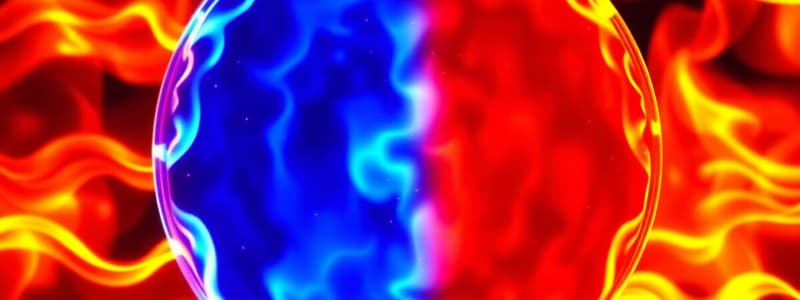Podcast
Questions and Answers
What defines heat?
What defines heat?
- Energy transferred due to temperature differences (correct)
- The phase a substance is in
- Energy that can do work
- The total energy contained in a substance
What happens when energy is lost from liquid water in a freezer?
What happens when energy is lost from liquid water in a freezer?
- The temperature of the water increases
- The water molecules organize into a solid (correct)
- The water changes to a fourth phase
- The water molecules become gas
What is the primary way heat is transferred in conduction?
What is the primary way heat is transferred in conduction?
- Through the movement of fluids
- From one gas to another
- Direct contact between substances (correct)
- Using electromagnetic waves
Which temperature scale is commonly used by scientists?
Which temperature scale is commonly used by scientists?
Which of the following is NOT a phase of water?
Which of the following is NOT a phase of water?
How does heat transfer occur between substances?
How does heat transfer occur between substances?
How does adding salt to water affect its boiling point?
How does adding salt to water affect its boiling point?
What happens to the temperature of water as it boils?
What happens to the temperature of water as it boils?
Which type of heat transfer occurs through electromagnetic radiation?
Which type of heat transfer occurs through electromagnetic radiation?
In which scenario would water likely not be boiling?
In which scenario would water likely not be boiling?
What does Boyle's Law indicate regarding boiling points at different altitudes?
What does Boyle's Law indicate regarding boiling points at different altitudes?
What is required for matter to change from one phase to another?
What is required for matter to change from one phase to another?
Which statement about absolute zero is true?
Which statement about absolute zero is true?
What is the relationship between temperature, heat, and kinetic energy?
What is the relationship between temperature, heat, and kinetic energy?
Which statement about heat is true?
Which statement about heat is true?
Flashcards
Heat
Heat
Energy transferred between substances due to temperature differences.
Temperature
Temperature
Measure of the average kinetic energy of particles in a substance.
Phase Change
Phase Change
Change of a substance's state (solid, liquid, gas) due to energy gain or loss.
Energy
Energy
Signup and view all the flashcards
Heat Transfer
Heat Transfer
Signup and view all the flashcards
Radiation
Radiation
Signup and view all the flashcards
Convection
Convection
Signup and view all the flashcards
Conduction
Conduction
Signup and view all the flashcards
Conduction
Conduction
Signup and view all the flashcards
Convection
Convection
Signup and view all the flashcards
Temperature
Temperature
Signup and view all the flashcards
Boiling Point
Boiling Point
Signup and view all the flashcards
Phase Change
Phase Change
Signup and view all the flashcards
Absolute Zero
Absolute Zero
Signup and view all the flashcards
Effect of Altitude on Boiling Point
Effect of Altitude on Boiling Point
Signup and view all the flashcards
Study Notes
Heat
- Heat is energy transferred between substances due to temperature differences.
- Heat flows from warmer to cooler substances until equilibrium is reached.
- An example is a stove heating a pot of water, transferring heat to the pot, and then to the water inside, causing it to boil. This demonstrates heat transfer.
- Temperature reflects the total energy added to a substance.
Changes in Heat and Energy
- Substances exist in solid, liquid, and gas phases.
- Phase changes occur when energy is added or lost, altering a substance's phase.
- For example, freezing liquid water loses energy, organizing water molecules into a solid structure (ice).
- Conversely, adding energy melts ice into water, and further heat vaporizes water into steam.
Heat Transfer
- Heat transfer occurs due to temperature differences.
- Molecules strive for temperature equilibrium through heat transfer.
- There are three main types of heat transfer:
- Radiation: Heat transfer through electromagnetic waves (e.g., sunlight warming the ground).
- Conduction: Heat transfer directly between substances in contact (e.g., a pot heating up from a stove).
- Convection: Heat transfer through fluids (liquids or gases) (e.g., heating soup in a pot).
Temperature
- Temperature measures the average kinetic energy of a substance's molecules.
- Kinetic energy is the energy of motion.
- Temperature is measured using different scales:
- Kelvin (K): Used in science, water boils at 373.15 K and freezes at 273.15 K.
- Celsius (°C): Commonly used in the metric system, water boils at 100°C and freezes at 0°C.
- Fahrenheit (°F): Commonly used in the imperial system, water boils at 212°F and freezes at 32°F.
- Temperature remains constant during phase changes. Adding heat during boiling only increases potential energy, not temperature. (e.g., boiling water).
- Boiling point can be used to identify substances; boiling point is a physical property.
Altitude's effect on boiling point
- Higher altitude results in lower atmospheric pressure, thus causing lower boiling points.
- For instance, water boils at a lower temperature on Mount Everest (160°F) compared to sea level.
Impurities' effect on boiling point
- Adding impurities (like salt) to water increases its boiling point, and decreases its freezing point.
- This means more energy is needed for phase change. Higher boiling point allows faster cooking in the case of pasta.
Relationship of Temperature and Heat
- Temperature is determined by the amount of heat energy in a substance or lost from a substance to its surroundings.
- Temperature is the average kinetic energy of a substance, influenced by heat input or loss.
- Molecule potential energy increases as molecules are further apart and increases in temperature.
- Absolute zero (0 K) is the theoretical state where all molecular motion ceases.
Studying That Suits You
Use AI to generate personalized quizzes and flashcards to suit your learning preferences.
Description
This quiz explores the concepts of heat, energy transfer, and changes in states of matter. Learn how heat moves between substances, the role of temperature, and how phase changes occur when energy is added or lost. Test your knowledge on the three types of heat transfer: conduction, convection, and radiation.




